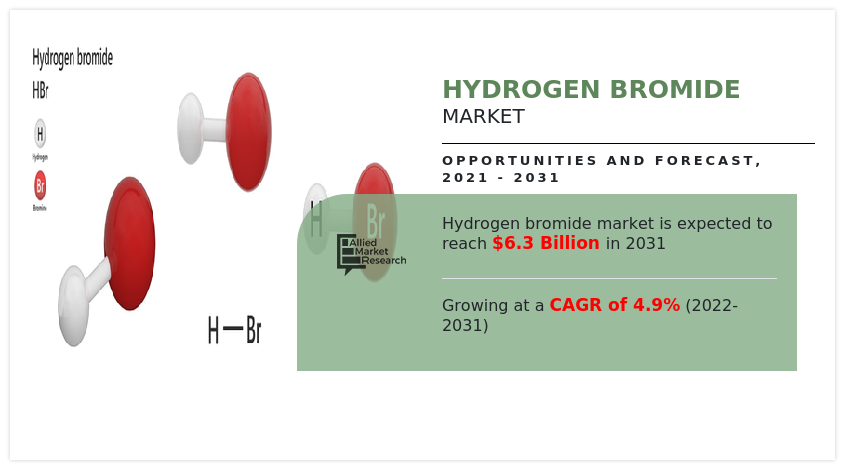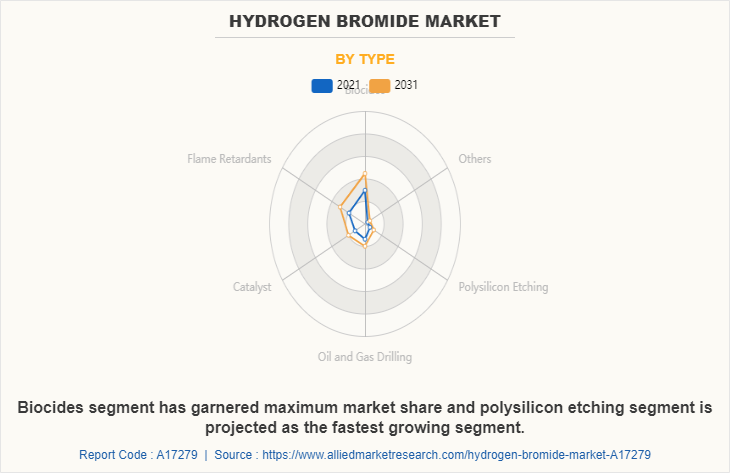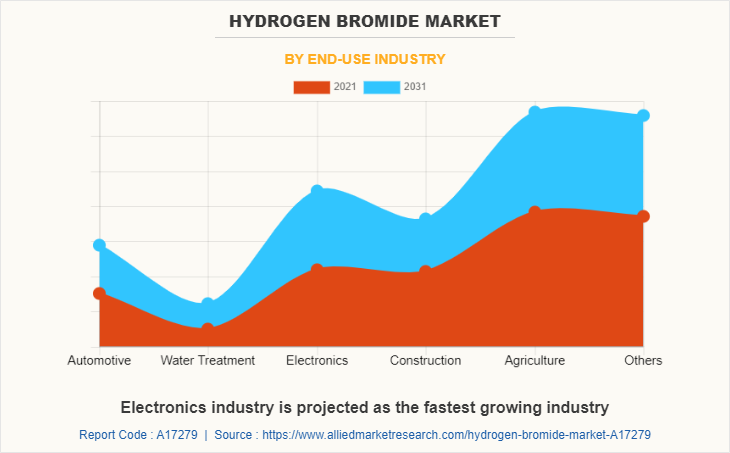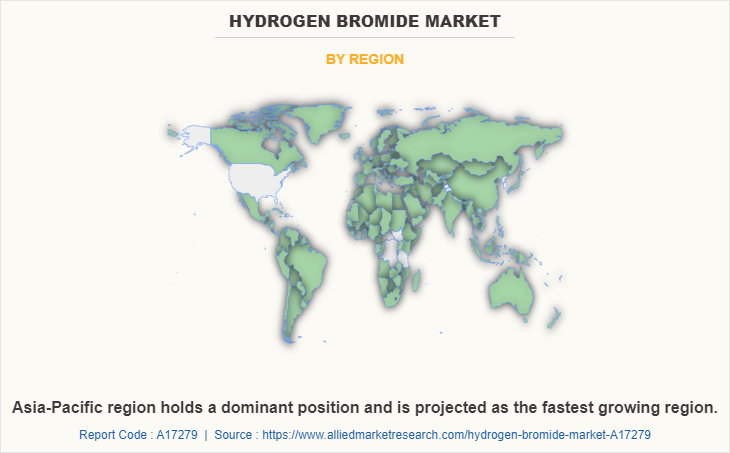Hydrogen Bromide Market Research, 2031
The global hydrogen bromide market was valued at $4.0 billion in 2021, and is projected to reach $6.3 billion by 2031, growing at a CAGR of 4.9% from 2022 to 2031.
Hydrogen Bromide (HBr) is a water-soluble gas that can also be produced as an aqueous solution by the chemical reaction of bromine and hydrogen. It is used in reactions as a catalyst and as a reducing agent. When hydrogen bromide is mixed with water, it produces hydrobromic acid, a strong acid that is primarily used in industry. Hydrobromic acid is used to add desirable properties to any chemical compound. It is also used in the manufacture of terephthalic acid, inorganic bromides, organobromines, and zinc, sodium, and calcium bromides. Because of its applications in industries, such as automotive, construction, and electronics, the global hydrogen bromide market is expected to grow at a rapid pace during the forecast period.

Increased demand for high-capacity batteries to meet energy demands is expected to drive the hydrogen bromide market during the forecast period. Wind power, solar power, and other renewable resources are expected to drive the growth of the hydrogen bromide market in the near future. Due to its dependable source for extensive energy storage capabilities, hydrogen bromide is also used in the flow battery application. Due to its quick kinetics and ability to carry out highly reversible reactions, it is used for energy storage. During the forecast period, the above-mentioned factor is likely to boost demand for hydrogen bromide. Hydrogen bromide can irritate the eyes and cause breathing problems. After prolonged exposure to hydrogen bromide gas, this may have negative effects on the human body. It is extremely corrosive and heavier than air. These are major restraints for the hydrogen bromide market. In the semiconductor industry, hydrogen bromide is used in the etching process of poly-silicon wafers, which are used to manufacture chips. Furthermore, it is used in the production of a variety of circuit boards throughout the industry. This factor is expected to drive the hydrogen bromide market growth.
Hydrogen bromide is used in the pharmaceutical industry in specific chemical content of medicines. The rise in global demand for effective therapeutics is expected to drive the demand for hydrogen bromide during the forecast period.
High demand for hydrogen bromide is anticipated during the forecast period due to increase in demand for electronic chips in Japan and South Korea. The need for advanced semiconductors in the electronics sector of rising countries in the Asia-Pacific region, including China, India, Indonesia, Japan, and South Korea, is expected to present profitable prospects for the region's hydrogen bromide producers. The expansion of the pharmaceutical sector in Asia-Pacific developing economies, such as Japan and South Korea is expected to drive the region's hydrogen bromide market during the forecast period. Furthermore, the hydrogen bromide market in Japan and South Korea is expected to be driven by increase in demand for reducing agents for usage in industrial applications such as organic and inorganic reactions.
The hydrogen bromide market is segmented on the basis of application, end-use industry, and region. Depending on application, the market is categorized into biocides, flame retardants, catalyst, oil and gas drilling, polysilicon etching, and others. Depending on end-use industry, the market is categorized into automotive, water treatment, electronics, construction, agriculture, and others. On the basis of region, the market is studied across North America, Europe, Asia-Pacific, and LAMEA.
Major players operating in the global hydrogen bromide market include, Air Liquide, Albemarle Corporation, Bhavika Chemicals Corporation, Chevron Phillips Chemical Company LLC, Gulf Resources, Inc., LANXESS, Linde plc, MATHESON TRI-GAS, INC, Neogen Chemical Ltd, Showa Denko K.K, Sontara Organo Industries, Tata Chemicals Ltd, Tosoh Corporation, Triveni Interchem Private Limited, and Verni Gas Corporation.
Other players operating in the hydrogen bromide market are Praxair, Inc., Chemtura Corporation, NRS Chemicals LLP, and Astitva Chemicals.
The hydrogen bromide market is segmented into Type and End-use Industry.

The biocides segment accounted for the largest share i.e., 32.2%, because it is used treatment of wastewater and the production of potable water. Others segment that includes pharmaceutical and power & energy is the fastest growing segment, growing around 6.6% CAGR during the forecast period, because of rise in demand for high-power batteries to satisfy energy.

The agriculture segment accounted for the largest share i.e., 24.3%, because it is used as soil fumigants in agriculture, especially fruit-growing, and as a fumigant to prevent pests from attacking. Electronics segment is the fastest growing segment, growing around 5.6% CAGR during the forecast period, because of increased use of semiconductors and flow batteries.

Asia-Pacific contributed the 52.4% market share in 2021 and is projected to grow at CAGR of 5.7% during the forecast period, owing to maximum number of growing electronics, automotive, and constructions. Asia-Pacific garnered a major share in the hydrogen bromide market.
Japan and South Korea Overview
· The demand for hydrogen bromide is being driven primarily by its increasing use in China, South Korea, Japan, and India. Rising infrastructure development and middle-class disposable income in South Korea and Japan have increased demand for flame retardants, which are widely used in insulation and the fabrication of plastic and electronic components.
· The expansion of the pharmaceutical industry in Japan and South Korea is expected to drive the region's hydrogen bromide market during the forecast period.
· Furthermore, the hydrogen bromide market in Japan and South Korea is expected to be driven by an increase in demand for reducing agents for use in industrial applications such as organic and inorganic reactions.
IMPACT OF COVID-19 ON THE GLOBAL HYDROGEN BROMIDE MARKET
- COVID-19 has spread across the globe and effected almost all aspects of life.
- Some major economies that have suffered severely from the COVID-19 crisis include, Germany, France, Italy, Spain, UK, and Norway.
- Due to lockdown and other restrictions imposed by governments to prevent the spread of infections, there was a shortage of raw supplies as well as manpower, further harming the supply chain for the market.
- Due to a lack of raw materials and interruptions in the supply chain, supplier contracts were terminated to reduce expenses. Due to reasons like the stoppage of construction, automotive, electrical operations, supply chain constraints, and a temporary halt in production, the demand from building and construction, automotive industries decreased.
- However, after the pandemic, as the supply chains return to normal after the restrictions were lifted, market participants in this market have explored for measures to minimize the pandemic's impact on their business.
Key Benefits For Stakeholders
- This report provides a quantitative analysis of the market segments, current trends, estimations, and dynamics of the hydrogen bromide market analysis from 2021 to 2031 to identify the prevailing hydrogen bromide market opportunities.
- The market research is offered along with information related to key drivers, restraints, and opportunities.
- Porter's five forces analysis highlights the potency of buyers and suppliers to enable stakeholders make profit-oriented business decisions and strengthen their supplier-buyer network.
- In-depth analysis of the hydrogen bromide market segmentation assists to determine the prevailing market opportunities.
- Major countries in each region are mapped according to their revenue contribution to the global market.
- Market player positioning facilitates benchmarking and provides a clear understanding of the present position of the market players.
- The report includes the analysis of the regional as well as global hydrogen bromide market trends, key players, market segments, application areas, and market growth strategies.
Hydrogen Bromide Market Report Highlights
| Aspects | Details |
| By Type |
|
| By End-use Industry |
|
| By Region |
|
| Key Market Players | Bhavika Chemicals Corporation, Triveni Interchem Private Limited, Chevron Phillips Chemical Company LLC, Gulf Resources Inc., Linde plc, Sontara Organo Industries, Verni Gas Corporation, Lanxess, Neogen Chemical Ltd, TOSOH CORPORATION, Tata Chemicals Ltd, showa denko k.k., MATHESON TRI-GAS, Air Liquide, Albemarle Corporation |
Analyst Review
Increase in demand for plasma etching processes, particularly in the electronics industry for use in semiconductor applications, is expected to fuel the demand for hydrogen bromide in the near future. Hydrogen bromide is an important component in plasma etching, which is necessary for improving the characteristics of semiconductors. Owing to its dependable supply for large-scale energy storage properties, hydrogen bromide is also used in flow battery applications. It is employed for energy storage because of its rapid kinetics and capacity to perform highly reversible reactions. During the forecast period, this factor is expected to increase demand for hydrogen bromide.
The hydrogen bromide market attained $4.0 billion in 2021, and is projected to reach $6.3 billion by 2031, growing at a CAGR of 4.9% from 2022 to 2031.
Increasing usage of hydrogen bromide in electronics industry are the upcoming trends of Hydrogen Bromide Market in the world
Asia-pacific is the largest regional market for Hydrogen Bromide.
Polysilicon Etching is the leading application of Hydrogen Bromide Market.
Air Liquide, Albemarle Corporation, Bhavika Chemicals Corporation, Chevron Phillips Chemical Company LLC, Gulf Resources, Inc., LANXESS, Linde plc, MATHESON TRI-GAS, INC, Neogen Chemical Ltd, Showa Denko K.K are some of the top companies to hold the market share in Hydrogen Bromide.
Increasing use of hydrogen bromide in flow batteries is driving the demand for hydrogen bromide.
COVID-19 had negative impact on hydrogen bromide market due to reasons like the stoppage of construction, automotive, electrical operations, supply chain constraints, and a temporary halt in production, the demand from building and construction, automotive industries decreased.
Loading Table Of Content...



